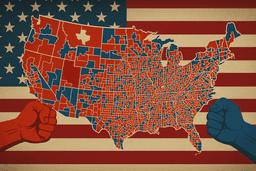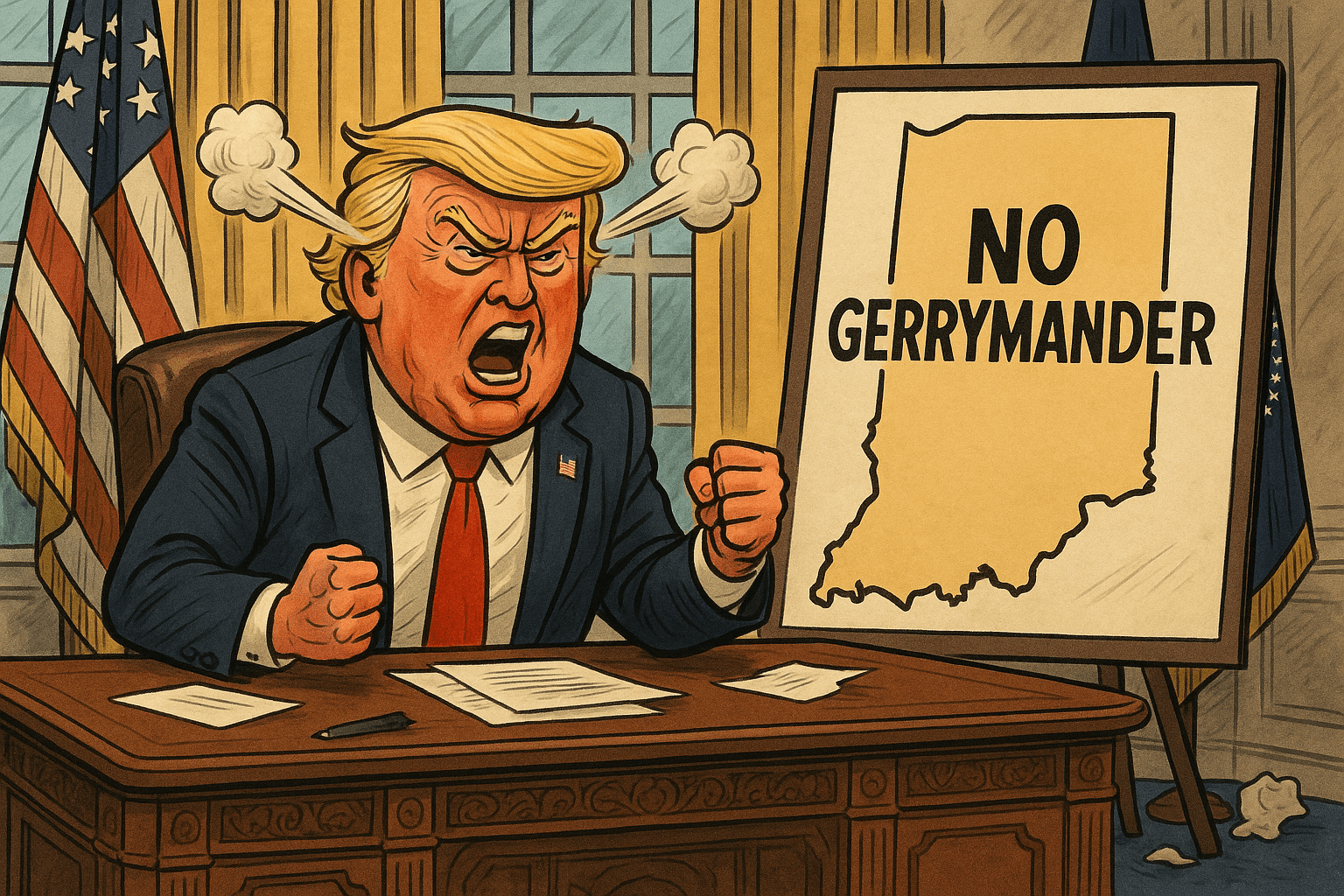Vote Nevada Targets Gerrymandering and Closed Primaries with Two New Ballot Measures

Vote Nevada PAC filed two constitutional amendment initiatives Tuesday aimed at transforming how Nevadans vote – and how maps are drawn. The group argues that its proposals will ensure a redistricting process free of corruption while guaranteeing all voters equal access to the ballot.
“Nonpartisan voters comprise 36% of Nevada's voting population, making them the largest group of voters; yet, they are shut out of our closed primary system,” said Sondra Cosgrove, executive director of Vote Nevada.
Denying any voter the right to vote in taxpayer-funded elections is wrong and must end.”
Nevada uses a closed partisan primary system. This means voters have to be registered with the Republican or Democratic Party in order to vote in critical taxpayer-funded elections where Nevadans cast the most consequential votes.
Enshrining The Right to Equal Access to Public Elections
Technically, voters can re-register with one of the two major parties on primary election day and then change their registration back to “unaffiliated” if they want. Only voters registered outside the parties have to jump through such hoops just to vote.
Meanwhile, these voters are expected to sacrifice their right to affiliate however they want as a condition to equal participation in elections. This is despite the fact that Nevada citizens added a Voter Bill of Rights to the state constitution in 2020, which states:
9. To equal access to the elections system without discrimination, including, without limitation, discrimination on the basis of race, age, disability, military service, employment or overseas residence.”
Noticeably, this right doesn’t explicitly mention discrimination based on political affiliation. One of the ballot questions filed by Vote Nevada aims to clarify that all voters have the right to equal participation in all taxpayer-funded elections.
The added provision to the Voter Bill of Rights states:
12. To fully participate in all publicly funded elections without limitation, including, but not limited to, any requirement to affiliate with any private organization, such as a political party.”
Thus, under constitutional law, the state would be required to conduct what Vote Nevada calls “unrestricted primaries.” This system could mean simply dropping the requirement forced on independent voters to re-register in order to request a party’s ballot.
The initiative also makes it clear that political parties can conduct their own private nomination processes. Vote Nevada points to the example of the national Democratic Party hosting a Zoom call in August 2024 to nominate Kamala Harris for president.
“If either or both of the political parties would like to manage a closed nominating process, they can do so at their own expense. A caucus or convention would be an example,” Cosgrove explained.
In 2024, Vote Nevada sponsored Question 3, which would have adopted the nation’s first statewide nonpartisan primary system that advanced 5 candidates to the general election, regardless of party, and used ranked choice ballots to determine a majority winner.
Voters approved it by a slim majority in 2022, but rejected it by approximately the same margin in 2024. In Nevada, such a change to the constitution requires an amendment to be approved in two consecutive elections.
In June 2025, Assembly Speaker Steve Yeager offered a semi-open primary bill that would have allowed independent voters to pick a party ballot in primary elections without changing their registration. It was approved by the legislature, but vetoed by Republican Gov. Joe Lombardo.
In his veto, Lombardo claimed voters had rejected this type of open primary in 2024. This is false. Yeager’s bill would have preserved partisan primaries. Question 3 would have eliminated party primaries altogether.
Vote Nevada Refiles Independent Redistricting Commission Initiative
Vote Nevada has refiled an independent redistricting commission ballot question that was attempted in 2020, 2022, and 2024. However, those amendments never made it to the ballot and now reformers are trying again.
This time, they have filed their initiative in the middle of a mid-decade redistricting fight between the two major parties -- something most voters say should be banned.
Here is what Vote Nevada's amendment proposes:
- Replace the legislature’s closed-door redistricting process with a balanced independent commission, equally composed of Democrats, Republicans, and non–major-party Nevadans.
- Transfer redistricting authority and funding from the legislature to this new independent body.
- Limit redistricting to within 180 days of the decennial U.S. Census—effectively banning mid-cycle redistricting and political map manipulation.
State lawmakers currently hold the power to redraw Nevada’s electoral districts. In the past, they have used this authority to keep districts safe for whichever party has majority control and to protect those already elected.
For example, the University of Nevada, Las Vegas published a 2006 essay that found that both parties colluded in their 2001 gerrymander to protect incumbents. In 2011, Gov. Brian Sandoval vetoed maps that allegedly targeted the Latino population in Clark County.
While the courts intervened, the redistricting process remained the same. Vote Nevada has called it “plainly corrupt”:
Consequently, legislators draw the people’s redistricting maps behind closed doors, blocking the public’s right to know who is enabling Nevada’s politicians to pick their voters. This is an indefensible, corrupt process that must change.”
In 2020, Fair Maps Nevada attempted to put an independent redistricting commission initiative on the ballot. Nevada Democrats sued, claiming the initiative’s description of effect was confusing. A judge allowed both parties in the case to work together to resolve the issue.
Fair Maps Nevada submitted a new description. The plaintiffs didn’t. And when the court accepted the new description from Fair Maps, Democrats appealed the decision to the Nevada Supreme Court, claiming the judge did not have the authority to do this.
Vote Nevada explained that this appeal violated a state statute that says once the description of effect is amended and accepted by the court, it cannot be challenged further – and yet the state Supreme Court agreed to hear the appeal before rejecting it.
With so much time spent in litigation and in the midst of the COVID-19 pandemic, Fair Maps Nevada had no opportunity to collect signatures.
In 2 of the 3 times reformers attempted to put the Fair Maps initiative on the ballot, it was challenged by state Democrats. This included in 2024, when the Nevada Supreme Court sided with Democrats over the lack of funding source in the proposed initiatives.
It is a complex legal matter that simply means the state Supreme Court can toss out any initiative challenged because it does not add a funding source, but if a funding source is added (like a new tax), it can be rejected for having more than a single subject.
This puts any initiative campaign in a difficult spot. If the parties don’t like what is being proposed, they will just have the courts block it.
In order to satisfy current legal standards, Vote Nevada had proposed transferring existing funding for redistricting to the new commission. Thus, the funding source is accounted for without needing to provide specific dollar amounts.
A new NBC News poll found that 82% of Americans support redistricting by a nonpartisan commission instead of the party in power. This includes 71% of Republicans in GOP-controlled states and 88% of Democrats in Democratic-controlled states.
Vote Nevada’s proposed commission isn’t nonpartisan, per say, but the group says it will give all voters, regardless of party affiliation or lack thereof, a seat at the table.
What’s Next
If cleared, both initiatives filed by Vote Nevada are slated to appear on the 2026 ballot, giving voters the chance to reshape the rules of democracy itself.
 Shawn Griffiths
Shawn Griffiths








